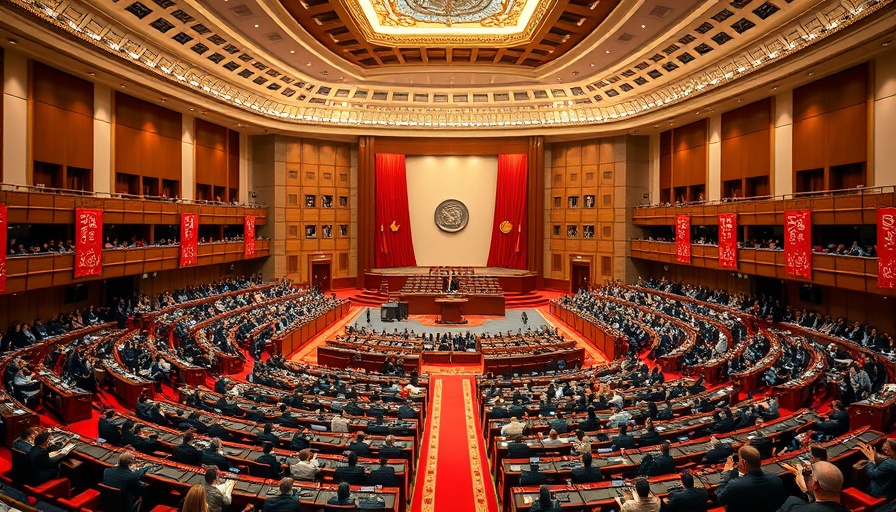
Artificial Intelligence Sparks New Optimism in China's NPC
The atmosphere at this year’s National People's Congress (NPC) in Beijing is markedly different from previous years. Historically subdued, this year's session is electrified by the groundbreaking advancements from DeepSeek, a homegrown AI startup that has captured the attention of investors, policy-makers, and the media alike. As the NPC unfolds, it becomes evident that AI is not just a tech trend but a dynamic force driving economic optimism and generating lively discussions among legislators.
Rising Competition: A Race for AI Hubs
The NPC found lawmakers attempting to pitch their respective regions as the next hub for AI innovation, echoing the competitive spirit seen in the solar energy and electric vehicle sectors in prior years. Just as cities like Hangzhou have emerged as technological powerhouses, advancements from DeepSeek and others are inciting excitement across various provinces. For example, lawmakers from Guangdong and Shanghai are not only producing proposals to enhance AI applications in healthcare and education but also advocating for a supportive ecosystem for small and medium enterprises to flourish.
The High Stakes of AI Regulation
While the excitement surrounding AI grows, concerns about its potential risks are also at the forefront of these discussions. NPC deputies have voiced apprehensions regarding misinformation, cyber threats, and the misuse of AI technologies. Qi Xiangdong, a cybersecurity expert attending the NPC, emphasized the urgent need for comprehensive legislation to mitigate these risks. He warned of vulnerabilities that exist within AI systems, referencing a recent cyberattack against DeepSeek that revealed the limitations in security protocols among private tech enterprises. This dual emphasis on innovation and caution underlines a new phase in China's tech narrative—balancing progress with responsibility.
A Gold Rush for Investment
DeepSeek’s rise has prompted government institutions to establish significant funding pools, with a state-backed guidance fund of 1 trillion yuan (about $138 billion) being allocated for AI and quantum technology development. This investment signals a substantial commitment from the Chinese government to solidify its position in the global tech arena. As various provincial governments unveil their own funds and incentives, it becomes clear that there will be a rush in AI investments in the short term.
Looking Ahead: Future Disruptions and Opportunities
The discussions at the NPC suggest that the AI sector is poised for transformative change, potentially reshaping industries and societal functioning. The optimism surrounding DeepSeek parallels previous tech booms in China, yet the government faces challenges in ensuring sustainable growth without succumbing to overcapacity or market instability. Experts predict that as regions push for AI advancements, we may see new applications emerge that touch on everyday life—from smart cities to enhanced healthcare services.
Final Thoughts: Embracing AI’s Dual Nature
As we witness this AI fever unfold within the ranks of China’s political elite, it’s clear that the nation's narrative is evolving. Striking a balance between harnessing the immense potential of AI while addressing the accompanying risks presents both challenges and opportunities for China. AI has the potential to be a driving force in economic revitalization, but it requires careful navigation to ensure that innovation proceeds responsibly.
By engaging with this timely topic, AI enthusiasts can stay ahead of the rapidly changing landscape and the implications it holds for the global tech industry. Each discussion at the NPC is not just a reflection of policy but a bellwether moment that may define future trajectories in technology investment and governance. Therefore, keeping informed about these developments is essential for understanding and harnessing the power of AI in society.
 Add Row
Add Row  Add
Add 




 Add Row
Add Row  Add
Add 

Write A Comment